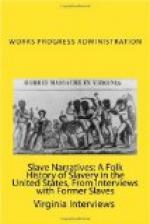Patterson, Amy Elizabeth
Preston, Mrs.
Quinn, William M.
Richardson, Candus
Robinson, Joe
Rogers, Rosaline
Rollins, Parthena
Rudd, John
Samuels, Amanda Elizabeth
Simms, Jack
Slaughter, Billy
Smith, Mr. and Mrs. Alex
Stone, Barney
Suggs, Adah Isabelle
Sutton, Katie
Thompson, George
Wamble (Womble), Rev.
Watson, Samuel
Whallen, Nancy
Whitted, Anderson
Woodson, Alex
ILLUSTRATIONS
Mary Crane [TR: not in original index]
John W. Fields
Anderson Whitted
[TR: Federal Writer Anna Pritchett annotated her interviews by marking each paragraph to indicate whether the information was obtained from the respondent (A) or was a comment by the interviewer (B). Since the information was presented in sequence, it is presented here without these markings, with the interviewer’s remarks set apart by the topic heading ’Interviewer’s Comment’.]
[TR: Information listed separately as References, such as informant names and addresses, has been incorporated into the interview headers. In some cases, information has been rearranged for readability. Names in brackets were drawn from text of interviews.]
Ex-Slave Stories
District No. 5
Vanderburgh County
Lauana Creel
An unhappy experience
[George W. Arnold]
This is written from an interview with each of the following: George W. Arnold, Professor W.S. Best of the Lincoln High School and Samuel Bell, all of Evansville, Indiana.
George W. Arnold was born April 7, 1861, in Bedford County, Tennessee. He was the property of Oliver P. Arnold, who owned a large farm or plantation in Bedford county. His mother was a native of Rome, Georgia, where she remained until twelve years of age, when she was sold at auction.
Oliver Arnold bought her, and he also purchased her three brothers and one uncle. The four negroes were taken along with other slaves from Georgia to Tennessee where they were put to work on the Arnold plantation.
On this plantation George W. Arnold was born and the child was allowed to live in a cabin with his relatives and declares that he never heard one of them speak an unkind word about Master Oliver Arnold or any member of his family. “Happiness and contentment and a reasonable amount of food and clothes seemed to be all we needed,” said the now white-haired man.
Only a limited memory of Civil War days is retained by the old man but the few events recalled are vividly described by him. “Mother, my young brother, my sister and I were walking along one day. I don’t remember where we had started but we passed under the fort at Wartrace. A battle was in progress and a large cannon was fired above us and we watched the huge ball sail through the air and saw the smoke of the cannon pass over our heads. We poor children were almost scared to death but our mother held us close to her and tried to comfort us. The next morning, after, we were safely at home ... we were proud we had seen that much of the great battle and our mother told us the war was to give us freedom.”




